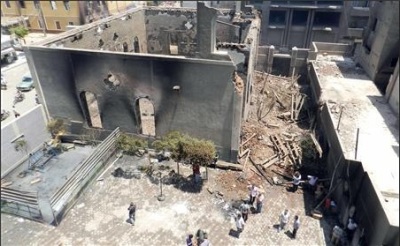Egypt Coptic Christians Talk Peace and Love, Refuse to Retaliate or Seek Revenge After Church Attacks

Egyptian Coptic Christians have refused to retaliate or seek revenge, and have instead promoted peace and love, as they attempt to recover from attacks against them, as well as the vandalism and destruction of many of their churches and institutions in recent weeks.
"I say to the Islamists who attacked us that we are not afraid of their violence and their desire to exterminate the Copts," said Botros Fahim Awad Hanna, the archbishop of Minya told Al-Arabiya.
"If we are not hitting back, it is not because we are afraid, but because we are sensible," he said.
Over 60 churches, predominantly in the Egyptian cities of Minya and Assiut, have been attacked since Aug. 14, when the country's military cracked down on Muslim Brotherhood supporters who were protesting the removal of former-President Mohammed Morsi.
Many of Morsi's supporters had blamed Coptic Christians for the overthrow of the leader, using them as scapegoats to justify attacks that left four dead and dozens of buildings devastated, turned into rubble, or tagged with slurs degrading or mocking Christians.
Miriam Nagi, who has spent the last week cleaning up her damaged church in Assiut, said through tears that the Copts would be resilient.
"The terrorists tried to ruin my church, my home, my people," Nagi told Time Magazine."But God will prevail against the terrorist Muslim Brothers."
In Minya, mobs torched the library, nursery and offices of the Jesuit Brothers' development association, though the adjacent 125-year-old Saint Mark Church was not burned. Although the destruction had been emotionally difficult for Father Birman, he pointed to his T-shirt bearing a slogan calling for love around the world.
"I am very angry," Biman told Al Arabiya.. "I also have compassion for the attackers, who have been brainwashed."
Nearly two weeks after the attacks, Coptic Catholic Patriarch Ibrahim Isaac Sedrak says that Egypt's interim government has still not arrested those responsible for the violence and destruction. Sedrak also accused the current military regime of ignoring the inflammatory religious rhetoric that he blamed for inciting the past month's Copt-targeted violence.
"The state is paying no attention to sermons coming out of the mosques, which are inciting Muslims against Christians," said Sedrak, according to The Catholic Herald.
Despite the lack of support from the current government, Sedrak also spoke out forcefully against foreign military intervention, demanding that the Copt violence not be used as an excuse for force.
"We are Egyptian, an integral part of the Egyptian people … foreign intervention in Egypt's internal affairs or its sovereignty under any pretext, for example under the pretext of protecting Christians, is rejected," he said.
Sedrak also said that he wanted to clarify to the Western world what exactly had happened in Egypt in recent weeks, contradicting other reports of the violence, saying "that the army and the police didn't act against the people, and that the [pro-Morsi] protests were not peaceful."





















